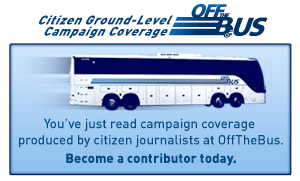
On September 11, McCain and Obama both spoke at Columbia University on national service--although not together, and after a day on which they'd agreed not to air TV ads or campaign against one another. It does not speak well of the campaigns that suspending them is an act of patriotic commemoration.
Neither Obama nor McCain was terribly specific about what "service" meant. For McCain, the military is obviously a touchstone. For Obama, it's community organizing. What service meant as an institutionalized, systemic practice was unclear, however, and both candidates shied away from talking about any kind of compulsory model of service.
Instead, they and other distinguished panelists (Caroline Kennedy and Laura Bush, Jeffrey Sachs and Queen Noor, Mayor Michael Bloomberg and Senator Orrin Hatch) reiterated the theme of a "culture of service." Hatch went beyond rhetorical flourishes and spoke about a Civic Index, which would include volunteering and charitable giving as indicators of civic health.
There also seemed to be some political push and pull about where this culture of service would come from. McCain kept mentioning faith-based organizations, and the candidates' appearance was funded and framed by corporate sponsors, most notably Target, whose spokesperson said, "Service is at the heart of Target." The CEO of AARP was also there, advocating for "collective service, collective voice, collective purchasing power."
Not surprisingly, McCain was particularly adamant that the government did not have to do everything. If FedEx or Target had been in charge after Hurricane Katrina, he said, we wouldn't have had truckfuls of ice melting by the side of the road.
Obama also readily acknowledged that non-governmental organizations contributed to service, but he pointed out that if it weren't for government, we wouldn't have a Civil Rights Act, the interstate highway system, and some of our parks. He also lamented the loss of some State Department capabilities--most notably USAID, which contributes to development overseas, and suggested that if young people didn't want to serve in the military, they could also work as civil servants or Foreign Service Officers.
Both McCain and Obama identified the most compelling part of service to be working for a cause greater than oneself. Service, they said, is its own reward, even in a time of economic struggle. Although one of the questions posed over the Internet focused on exactly this point--how, exactly, were citizens going to find the time to volunteer when they were already strapped for cash and time?--neither candidate used the opening as opportunity to speak substantively about the economy. Instead, they saved their most energetic responses for what would seem to be the issues closest to their hearts.
When McCain spoke about military recruiting, he leaned forward and spoke rapidly. We needed to provide more incentives for serving in the Armed Forces, he said, and he pointed out that military recruiters weren't even allowed on Columbia's campus. "Shouldn't students be exposed to attractiveness of servicing in military, especially as an officer?" he said.
Obama also expressed the need to increase the military, especially to reduce deployments and focus attention on Afghanistan, but at several points he repeated that the role of the president was to inspire people. He concluded by saying that the presidents he admired--John Kennedy, Bill Clinton, and Teddy Roosevelt--tapped into the country's idealism and understood how to mobilize its citizens.
